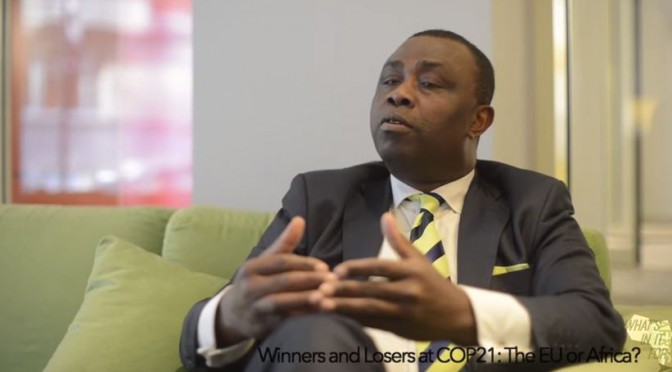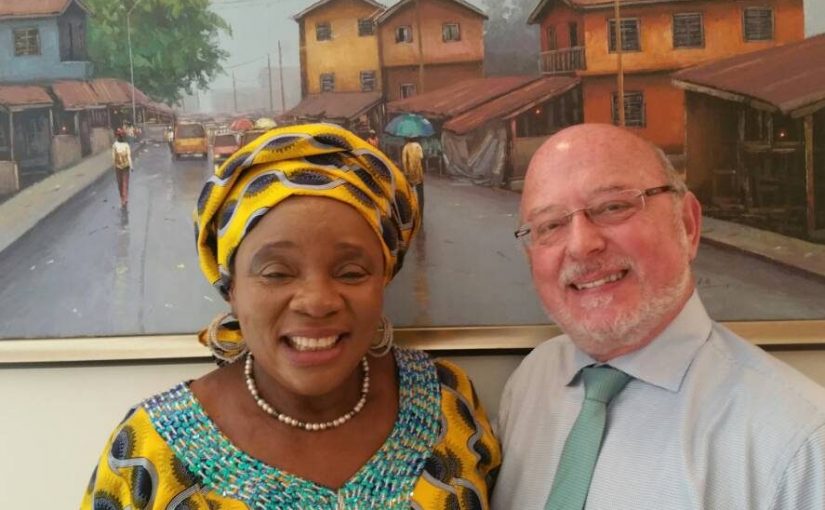Tag: Nigeria
Partnerships for Achieving Nigerian Diaspora Voting
Providing editorial consultancy for this documentary film project, it was my pleasure to assemble four critical resource persons under the leadership of Diaspora Industrialist and Author, Dr John C. George, to provide penetrating insights into how far Nigeria has come on Diaspora Voting. The discussants equally delved into what exactly needs to happen to make Diaspora Voting happen. The outcome is a unique cross-fertilisation of ideas.
Nigerian Diaspora Voting may be a long time in coming but it no longer is a matter of if it will happen. It is now a question of when.
Tinubu at his First UN General Assembly
Here an attempt to predict what Tinubu will be telling the world when he speaks later today at the 78th United Nations General Assembly
An Advocacy Birthed After a Year of Incubation
The deterioration of Nigeria has been on for quite a while. The current generation of Nigerians has not known a nation that truly held promise for them. Yet, in view of the global village which the world has become, this generation of Nigerians understand what it means for one’s country to hold promise for one. They feel deprived, rubbed and battered. Some feel defeated. A few are resilient. Yet others
are battle-ready to win back their country.
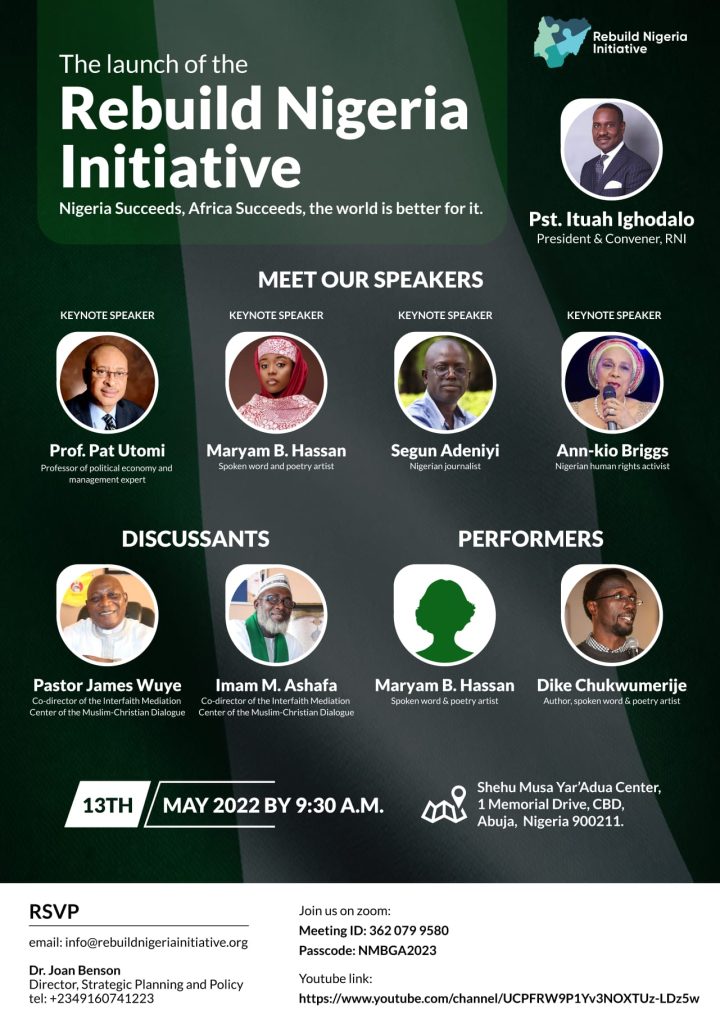
The battleground for the battle-ready young Nigerians are the streets of the country, from North to South, East to West and they manifest in banditry, kidnapping, petty to serious robbery and anything in between. It used to be that the ghost of Biafra roamed only the streets of Igboland. But with the passing years, the spirits of Oduduwa is being invoked actively while up North the chant for Arewa as a republic in whom its descendants have more faith, is getting louder. The guns have failed to silent the chants.
The fathers of this generation and their fathers look on helplessly realising that they have failed their children and grandchildren. Yet some have refused to be spectators of this carnage. They are conscious of the fact that throughout history, meaningful change was brought about by men and women who refused to be spectators of human suffering and injustice but stood up and acted. By acting, they changed their society and the world. Over the past year, in the middle of the Covid-19 pandemic, a group of Nigerians has been reflecting on these ironies of a nation and have decided to lean on the strength of others around the world who have changed their worlds by shire courage.
They have reasoned that this failing state called Nigeria, can’t be allowed to fail.
In the summation of these Nigerians, the missing link in the potential great nation that their fatherland ought to be and the weak entity that it is currently, is genuine dialogue! Nigeria must genuinely dialogue to reconcile not only its diverse people, but also its contradictions. Rebuild Nigeria Initiative was birthed to activate genuine dialogue, which is precursor to reconciliation and a halt to the speedy slide into disintegration of the largest black nation on the face of the earth. We have abiding faith in a new Nigeria, united, equitable, just and inclusive – A Nation at Peace.
Over the past year, Rebuild Nigeria Initiative has consulted widely, at home and in Diaspora, with Nigerians and friends of Nigeria. Our ambition as a group of concerned Nigerians around the world to build a global coalition of strategic stakeholders and partners, is one that strikes a cord with all who
have heard us out.
The launch of Rebuild Nigeria Initiative is the start shot of an advocacy work whose pertinence has been tested and demonstrated over an incubation phase of a year. We invite the world to meet us, to work with us, because when (not if!) Nigeria succeeds, Africa succeeds and the world is better for it!
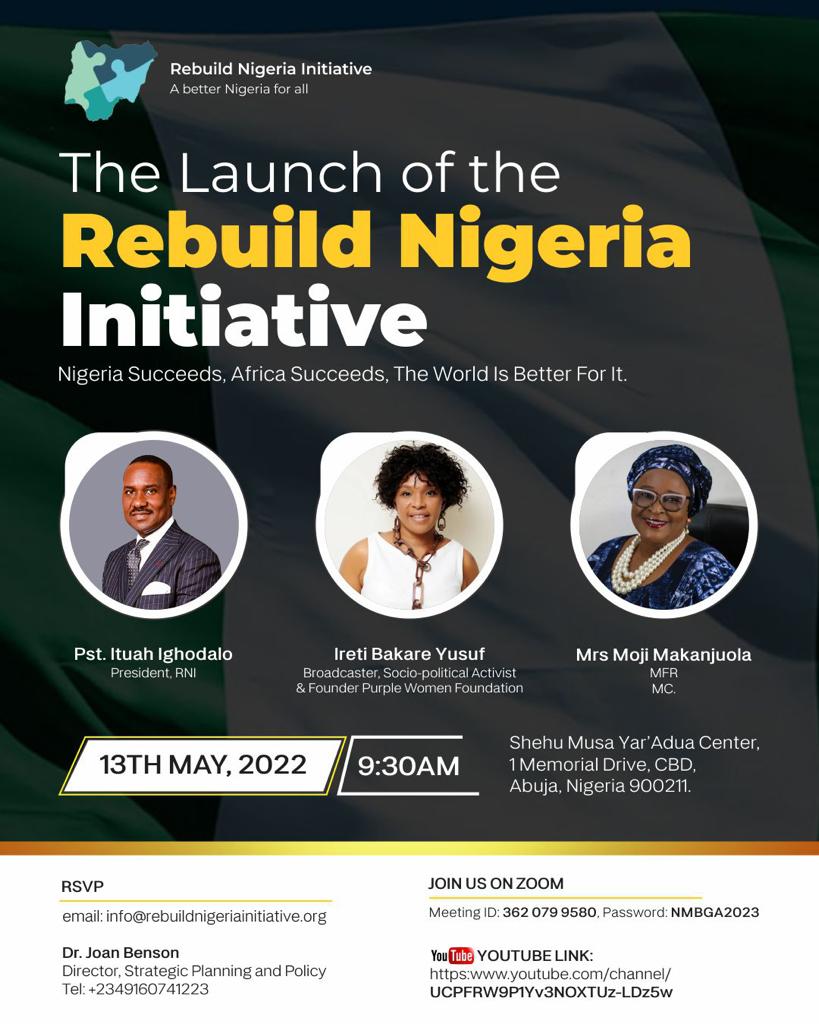
Public Broadcasting in a New Media Ecosystem
In this op-Ed Nigeria’s Uche Nworah examines how State-Owned Broadcasting Stations could stand the fierce competitive media environment in a fast changing world.
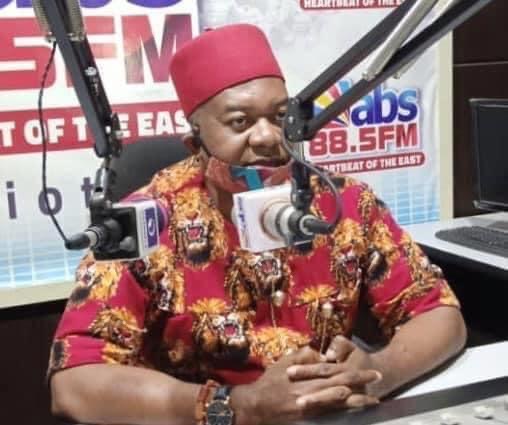
We live in exciting and interesting times. Major disruptions continue to occur across different sectors, driven by technology, innovation and globalisation both pre, during and most likely post- Covid-19 pandemic.
Tom Godwin, Executive Vice President and Head of Innovation at U.S.A – based Zenith Media while discussing the changing global business environment pointed out the mind-blowing disruption that is taking place in some sectors. He mentioned for example, Uber, the largest taxi company in the world which owns no vehicles. Amazon, the largest bookstore in the world which owns no bookshops. Alibaba, the most valuable retailer in the world which owns no inventory, and Airbnb, the world’s largest accommodation provider, which owns no real estate. He concludes that ‘something interesting is happening’.
Here in Nigeria, looking at the media sector, our own Linda Ikeji, before she started Linda Ikeji TV was easily Nigeria’s highest earning media personality, but without any physical structure and facilities. She commands audiences and revenue that long established media organisations can only wish and dream about. There are many other examples.
The disruption in the media sector has been unprecedented especially in the digital era. We no longer talk about broadcasting but digital broadcasting. The language spoken today is no longer that of programmes and programming but of content, content provision and distribution. The present broadcast media eco-system in Nigeria poses huge threats but at the same time presents big opportunities for practitioners.
In the digital broadcast industry, It will appear that state-owned media organisations are the most affected in several ways; (1) Global and national economic challenges have led to massive reduction in government subvention (2) Reduced subvention has triggered a wide expectation for more internally generated revenue that is not readily realisable
(3) Advertising revenue continues to decline as advertisers appear to favour media stations on cable networks (DSTV, GOTV, StarTimes etc) which guarantee wider reach and audiences. (4) With the existing licensing, operational and regulatory framework by National Broadcasting Commission (NBC), terrestrial television with its localised/limited reach appears ‘dead’, and will always struggle against digital broadcast media on digital platforms and cable. Terrestrial TV has no future and is almost ‘dead’. It’s now a ‘poor man’s TV’, poor men being those who don’t have DSTV, Startimes or GOTV decoders or those that their subscriptions have expired. Not many people like the idea of switching from terrestrial TV antennas to DSTV and other cable decoders. It’s untidy. One decoder box for all (whether state owned or independent TV) appears just the right solution.(5) State media with reduced subvention and reduced advertising revenue are not able to fund the production of quality content which attracts and helps retain viewership, neither are they able to attract and retain creative staff (6) In the new media eco-system of ‘Content is King’ as mantra, state – owned media are increasingly being driven into extinction. If state owned broadcast media do not wake up to the realities of the times, they may soon find themselves in the media graveyard, just like their newspaper counterparts. In the 70s and 80s, every state in Nigeria had a thriving state owned newspaper, today, perhaps only a handful including Anambra’s National Light, off-shoot of Daily Star from the old Anambra state still manages to publish (7) Many state owned media still suffer the choking effects of state control including editorial interference and control
(8) Just like the laws setting them up which may have become obsolete, state- owned broadcast stations suffer from near -colonial, and military era hangover extending to their bureaucratic organograms incorporating obsolete job roles. These now require updating. A lean and flat organogram is recommended
(9) The civil and public service mindset have made many state -owned state media to become talent graveyards. They lack the dynamism, creativity and flexibility required to compete in today’s digital media world (10) Other issues have been identified as hindering the survival of state-owned TV stations including the analogue nature of their broadcast equipment, over bloated workforce etc.
What can state-owned broadcast media do differently? How can they compete in the new media eco-system? To survive will require new ways of thinking, and new ways of doing things on their parts. Some of these challenges have to be addressed by the stations themselves. Others fall under operating factors in the external environment beyond their control.
For example, in Nigeria, only Lagos Television (LTV), and Ogun State Television (OGTV) are the two state-owned television stations on the DSTV cable platform. This situation is most unfair as it bestows on the two stations superior advantages of wider audience and increased advertising revenue. Other state -owned stations make do with the 3KW transmitter and regional licence that NBC permits. This surely cannot be said to be a level playing field as the disadvantaged state stations that are denied access on the DSTV platform still carry the same operating costs by way of paying staff salaries and allowances, equipment maintenance, content production, diesel and other costs. For example, at Anambra Broadcasting Service, despite investments by Governor Willie Obiano in new digital equipment, construction of new digital studios, renewed focus on quality content production and other improvements, it has not been possible to secure approval to host the ABS TV on the DSTV platform. This is despite repeated visits, applications and meetings with the DSTV management including submission on hard drive of content types produced by ABS as demanded by DSTV. The story has been and is still that there are no new available channels on the DSTV platforms, but we see new channels being added every day with some platforms having up to 3.
The argument in some quarters that state-owned broadcast stations are heavy on propaganda and do not produce quality content is pre-judgemental and biased. In a free market place where the playing field is level, let the audience and advertisers determine that. With the ongoing efforts by the Federal Ministry of Information to launch an audience measurement system, it will be easy to make objective judgements. Let the market determine which station survives and which goes under. After all, we can not give all thumbs -up to all the channels on DSTV as having super contents.
Also, arguing that state-owned broadcasting stations are not yet ready for digital migration to the DSTV and other such platforms shortchanges and punishes those who are. All should not be painted with the same brush.
To survive, state -owned broadcasting stations may need to introduce other services and earn side income. Industry watchers have suggested selling or syndication of their content. Anambra Broadcasting Service (ABS) has launched the Miss Anambra beauty pageant, publishes magazines, launched ABS Film Academy, promoted music and cultural events etc to earn additional revenue.
The regulator, National Broadcasting Commission (NBC), the National Assembly, the Federal Ministry of Information, the Nigeria Governors Forum (NGF), Radio and Television Workers Union (RATTAWU) and other stakeholders should intervene by making it a matter of policy for DSTV and other cable platforms in Nigeria such as GOTV, StarTimes etc to allocate channels to state – owned TV stations on their respective platforms. This is an existential matter for state-owned broadcast media, and is the only way to ensure that no one is left behind in the emerging media eco-system. This will also help open up the space for fair competition, promote creativity, and guarantee increased employment, stop loss of jobs and enhance wider participation of youths in the creative economy at the state levels. If this is not done, our teeming youths who want to play in the media and creative economy will continue to migrate to Lagos. Can Lagos provide jobs for everybody?
To reach a wider audience, we at Anambra Broadcasting Service (ABS) have had to resort to online streaming via our Facebook, Youtube and Instagram channels, including our website (absradiotv.com) some of our TV and radio content to satisfy the yearnings for home content by Ndi Anambra in the diaspora and other target groups. Other state TV stations could also adopt this model although it has huge cost and other implications. Also, the audience do complain of data streaming costs.
Opening up the cable TV space for state-owned TV stations to play in should form one of the key proposals in the ongoing consultations by the National Broadcasting Commission (NBC) which is seeking to review the 6th edition of the Nigeria Broadcasting Code.
Nworah is Managing Director / CEO of Anambra Broadcasting Service (ABS) Nigeria. This piece was originally published under the title State-Owned Broadcasting Stations and Media Ecosystem
Whole Society Approach to Counter-Terrorism
Today the United Nations wraps up a two-day regional conference in #Nairobi, #Kenya ?? on global actions to prevent and combat terrorism. Here in a news bulletin on #TRTWorld, I shared a brief view on its global implication and what it portends for Africa. https://youtu.be/GgliHkKFM1I
Economic Diplomacy & the Diaspora
I was delighted to have made a presentation at a Multi-sectoral Stakeholders Economic Investment Summit organised bySME Secretariat and hosted at the Lagos Chamber of Commerce, Victoria Island, Lagos Nigeria on Monday 21 January 2019
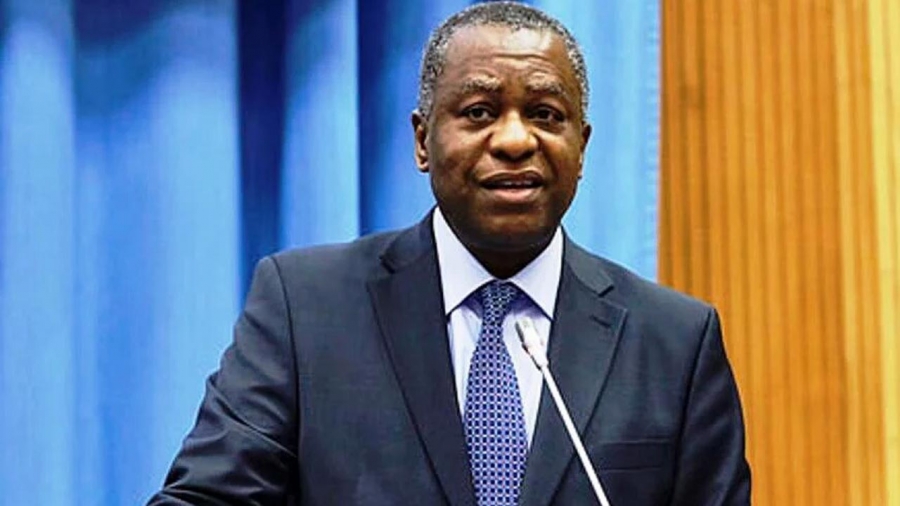
I used the opportunity to review the Nigerian Economic Diplomacy Initiative (NEDI) of the Ministry of Foreign Affairs of Nigeria under President Muhammadu Buhari. After a general refresher of what NEDI is all about, I dropped the following conclusions on this policy initiative:
- NEDI is a strategically important policy tool with huge potentials to make a structural difference in economic regeneration of Nigeria with focus on non-oil sector
- NEDI made a good start but has clearly not lived up to its biddings. It has failed rather woefully in showing evidence that it has made a convincing start in delivering on the important task of enhancing inter-agency collaborations
- There is no visible effort on the part of NEDI to genuinely engage the Diaspora in a result-oriented way
- Unless there is a change of course, NEDI is marked to fail!
I wrapped up with these sets of recommendations:
- Foreign trade component should be introduced into the operations of all Ministries, Departments & Agencies (MDAs)
- A NEDI Attaché should have a sitting in all major Missions of Nigeria worldwide where possible or the role unambiguously integrated into the duties of all diplomats charged with economic affairs
- A formal working relationship should be initiated with Nigerians in Diaspora Organisation (NIDO) worldwide to enhance professional Diaspora mobilization
- Clear targets should be set for inward investment flows as aconsequence of NEDI activities
Access to the integral PowerPoint Presentation on Economic Diplomacy & the Diaspora is possible:https://1drv.ms/p/s!AuyRKnHzz067wRMWQFFnd28yiaXL
New Era of Nigeria-Belgium Relations
Nigeria and Belgium have a 56 year diplomatic relations. When the new Ambassador of Nigeria to Belgium presents her Letters of Credence to His Majesty, Phillipe I, King of the Belgians today, Wednesday 13 September 2017, the relationship will witness a new era. Ambassador Nonye Udo will make history as the first female Ambassador of the Federal Republic of Nigeria to the Kingdom of Belgium. With this, one can say that Belgium has a lesson to learn from Nigeria on gender equality and gender balance because unless I am mistaken, no woman has ever had the opportunity to be appointed Ambassador of Belgium to Nigeria. For a change, Belgium is therefore welcome to play the catch-up here.
That is on the lighter side. On a more serious note, Ambassador Nonye Udo was not sent by President Muhammadu Buhari to represent his Government in Belgium, with concurrent accreditation to the Grand Duchy of Luxembourg and the Mission to the European Union because he is desirous to making history. Far from it. The plain fact is that a seasoned diplomat who knows her onions was appointed on merit into one of the most strategic diplomatic posts for Nigeria. That seasoned diplomat simply happened to be a woman, one whose appointment made history!
That raises the curious question of what is Her Excellency’s story? Who is Nonye Udo? Those in the know of her person and career would, before anything else, describe her as “A fine Foreign Service Officer” Ambassador Nonye Udo is a career diplomat. Having served at different diplomatic posts worldwide including Nigeria’s Mission to the United Nations, was until her appointment the Director of the Department of International Organizations at the Abuja Headquarters of the Ministry of Foreign Affairs of Nigeria. The strategic nature of Brussels in the scheme of things in Nigeria’s global aspirations perhaps gives one a sense of why President Buhari made that decision to send unarguably the best to Belgium.
As I reflected on the shape of this new diplomatic era, the challenges that face the Nigeria-Belgium relations, but also the huge opportunities awaiting Nigeria and Belgium to explore, and in a funny way, what readily comes to mind was one of the trickiest media questions I’ve had to answer as Belgian of Nigerian origin. A cheeky journalist, bent on testing my loyalty or allegiance to these two countries that mean the world to me. This was on the occasion of a football match between Nigeria and Belgium. He went: which country do you favour to win this match – Belgium or Nigeria? I paused and looking him straight in the eyes and without thinking, I responded that the better team will win and whichever it is, it’s a WIN for me all the way. I am not sure, but walking away, the mischief-maker looked disappointed. He appeared not to have gotten the answer he wanted that would create certain kind of news sensation for him.
In a note I sent earlier today to the amiable Ambassador, I opined that beyond confirmation of her formal diplomatic accreditation as Nigeria’s Ambassador to the Kingdom of Belgium, I am sure that I will be expressing the sentiments held deep in the hearts of many Nigerians and Belgians with interests in both countries that her historic appointment as first female Ambassador could not have come at a better time. “You must have every reason to feel a great sense of honour to be head of mission in a country with which Nigeria has such a cordial, mutually beneficial, long-standing diplomatic relations dating back to 1961, and with which there are so many opportunities for collaboration across many fields of endeavour including trade and investment, manufacturing, agriculture, machinery, energy or power production and distribution, sports and culture, to name but a few” I said this with confidence because long before Her Excellency assumed office, the Belgium Luxembourg Nigeria Chamber of Commerce, a network of business people and players, Belgians and Nigerians, of which I have the privilege to serve on the Board as Director Business Development and a number of other groups and individuals, have been working to reinforce these ties, and to forge new alliances. My personal goal, which I am sure a significant number of peers share with me, is to set the ball rolling towards taking the Nigeria-Belgium bilateral relations a notch higher, outside the multilateral sphere. Contacts with our Belgian friends and associates do confirm their favourable disposition and readiness to enhance engagement with Nigeria. My immediate constituency of West Flanders boasts of the finest industries in pharmaceutical manufacturing, food and beverage as well as tourism and agriculture, exactly the sectors that Nigeria is impatient to delve into, since the future is no longer oil. When I close my eyes, these are the industries I see and wish to get business people from both sides talking business. The Embassy could be an omissible arranger and facilitator.
I also thought of my Nigerian-Guinean Diaspora friend that works as International Civil Servant at the European Commission who once called me a “dreamer” after listening to one of my TV calls for a better balance between bilateralism and indirect international development model where the civil society organisations and the NGO’s are more involved in development projects with a lessening of Government-to-Government traditional approach. I do hope to take this dream to our new lady in town in the coming months. Who knows, we might set the ball rolling gradually.
EASTER REFLECTIONS OF AN AFRICAN BRAND ICON
The resurrection of Jesus Christ is the Christian religious belief that, after being put to death, Jesus rose again from the dead. It is the central tenet of Christian theology and part of the Nicene Creed: “On the third day he rose again in accordance with the Scriptures”. His resurrection changed our witnessing, our conversations, our beliefs… Our faith in Christ Jesus gave us hope for eternity.
Easter brings Nigeria to my mind with the central question of whether this is the Nigeria handed down to us by our forefathers…
No, this is not the Nigeria our forefathers dreamt of and bequeathed to us. The brazen and unapologetic looting of the national treasury has never been this bad.
Leadership based on ego, whims and personal needs as against the global or communal. As we celebrate the resurrection of our Lord, we need to reflect on our personal values… individually and collectively. It’s time to go back to the basics. It’s time for a national rebirth…
Easter brings to mind the Brands to Watch for the good of the Nigerian nation.
The spirit of Easter gives me reasons to reflect on those national human treasures who by what they have chosen to do are the brands that are helping to reshape Nigeria. The message this Easter is that such brands appear to be in short supply and must be multiplied for the good of nation.
This is our next call.
Would your Brand Rise Up and be Counted?
Time to Resurrect the Good in us all.
Happy Holidays Nigeria
Happy Easter World
The author, Charles O’Tudor is one of Nigeria’s foremost brand expert, founder Adstrat Brand Management Consultants and the Chairman of The Brand Council, owners of Charles O’Tudor BrandToWatch Awards
Swapping Shoes: sofa talk between a European and an African
People treat you differently if you don’t know the language. Condescendingly, as if you’re a child. An aunt from the Flemish side of the family once even said, “I keep forgetting you have a university degree” – Chika Unigwe
When two professional women settle into the sofa for a chat, it is expected to be deep. So it was between Femke van Zeijl and Chika Unigwe. Femke grew up in a Dutch village, some 40 kilometres away from Turnhout, the Belgian town where Chika migrated to in 1995. On her part, Chika grew up in Enugu, a town in eastern Nigeria. The irony is that in 2012, the migration turn fell on Femke who settled in Lagos. The purpose of the sofa talk between the two divas was to compare notes on their migration experiences. Thereafter here is Femke’s footnote on the conversation “I confess that Lagos’ noise sometimes makes me crave silence. Chika likes the liveliness she is used to from back home. She prefers to write in a crowded café and never goes looking for quietness. For a moment I find myself longing for half an hour of silence in her Turnhout street”
Femke van Zeijl: You describe migrating to Belgium as ‘losing your voice in small imperceptible ways’. What do you mean by that?
Chika Unigwe: It seemed I had to learn everything all over again. All etiquette and forms of politeness, as if I was a child again. I certainly made as many mistakes as a child. It started with my first breakfast at my in-law’s house. I was still in bed when I was sent for: everyone was at the table waiting for me. My Flemish family had breakfast together at the dinner table, and I was supposed to be present. Whereas I can’t remember we ever had dinner together at the table back home in Enugu. At our place, you ate when you were hungry. With your plate on your lap, wherever you wished.
Femke van Zeijl: I on the other hand always waited here in Lagos until everyone had food on their plates, as my parents taught me. But that would invariably lead to a Nigerian inquiring whether I did not like the food.
Chika Unigwe: You have the advantage of speaking a language many people in your new country understand. I did not speak Dutch at the time. That first year in Belgium was very hard for me. I do not like to be reminded of that period. People treat you differently if you don’t know the language. Condescendingly, as if you’re a child. An aunt from the Flemish side of the family once even said, “I keep forgetting you have a university degree”.
FZ: I notice that I get away with things because I am a stranger. Nigerians figure I don’t know all the customs and sensitivities, and so they are forgiving when I make a faux pas. Is that your experience as well?
CU: No, in that sense Africa and Europe are extremely different. In Belgium you are expected to integrate, preferably assimilate. To whisk away your own culture as much as possible. You are supposed to eat chips with mayonnaise, like a proper Belgian. People prefer to hear that you like that more than your own food from home. Then you are a successful migrant. When a European comes to Africa though, nobody expects of him that he will integrate or assimilate. On the contrary: the biggest African ghettos are the compounds where white people live. You are an exception, Femke. You want to get to know the people and are living amongst them.
FZ: Sounds like I am having an easier time in Lagos. When I have amala in a local buka, the whole neighbourhood gathers to come see the miracle. And the little advantages I undeservingly get thrown for being white… The other day the personnel of a bank wanted to have me cut a very long Friday afternoon queue to be helped first. I was so embarrassed.
CU: When a white person migrates to Africa, he is going from a position of power, to power. An African coming to Europe lands from power into powerlessness. We Africans cannot do much with our diplomas here. Once I had learned Dutch and went to the job centre, they offered me a position as a cleaning lady. And in the shop it happens regularly that someone follows me around to check that I am not stealing anything. In expensive boutiques I might not even get served. The sales personnel assume I cannot afford to buy anything anyway. Whereas a white person in Nigeria, even if he has no skills whatsoever, always gets opportunities. No Nigerian would dream of offering you a job as a cleaning lady.
FZ: How did you overcome your initial powerlessness?
CU: By learning the language. The more I mastered Dutch, the less lonely I felt. I became more self-assured, which yielded me more respect. Language makes you independent and gives you a voice. And with that voice you can even change people’s views, because a stranger teaches you to look at yourself in a different way. A while ago I was interviewed on Belgian radio about classical music. Back home we never listened to that, and the first remark of the presenter was ‘So you did not have a culture of music at home?’ So I asked her: ‘Do you know highlife music? No? Well, my father always listened to that, and would consider you a barbarian because you have never heard of it.’ She had never thought of it that way. There is no absolute standard for civilisation; it is different for each culture.
FZ: Does your integration into Flemish society resonate in your work?
CU: My first novel was staged in Turnhout, close to my new home. The second was about Nigerian women in Antwerp and in my third book I returned to Nigeria. By that time I had fully regained my voice. My new book that has just been published covers an entirely different matter: a former slave in the eighteenth century.
FZ: Nigeria has taught me to add ‘Sir’ and ‘Madam’ to my sentences. Forms of politeness are still much more observed here then in The Netherlands. Are there things your new country has taught you?
CU: When my husband’s uncle was on his deathbed, the entire family was called to come and say goodbye. Very beautiful. That would never happen in Nigeria. Even if you are ninety, everyone keeps praying for a miracle. Death is much less of a taboo in Belgium. I find that very pleasant.
FZ: You are one of the few people who didn’t consider me nuts when I decided to move to Nigeria.
CU: Lagos is not an easy place to live in. When you told me you wanted to live there, I thought you were brave. But then again, that is what my sister said of me when I moved to Belgium with my husband nineteen years ago. We both followed our dreams. There are many too afraid to do that. Migrating is an act of courage.
hThe power is cut on my side, and all around my two-bedroom apartment generators start rumbling. I confess to Chika that Lagos’ noise sometimes makes me crave silence. She laughs. Chika likes the liveliness she is used to from back home. She prefers to write in a crowded café and never goes looking for quietness. For a moment I find myself longing for half an hour of silence in her Turnhout street.
**********************************************
Chika Unigwe grew up in Enugu, a town in eastern Nigeria. There she met her Belgian husband, with whom she migrated in 1995. Her fourth novel, The Black Messiah, was recently published in Dutch. For her second book, On Black Sister’s Street, she received The Nigeria Prize for Literature. Chika lived with her husband and four sons in the Flemish town of Turnhout but has recently made another big move as she and her family migrated to the US.
Femke van Zeijl grew up in Berkel-Enschot, a village in the Dutch South about forty kilometres away from Turnhout. For the past eleven years she has traveled sub-Saharan Africa as a freelance journalist. She has written two books based on her reporting. The second, Gin-Tonic & Cholera, is about urban life in Africa. In 2012 she settled as a freelance correspondent for Dutch media in Lagos, a city that is estimated to have more inhabitants than her country of birth.
source: Brittle Paper article “Strangers in Each Other’s Countries: A Discussion with Chika Unigwe” by Femke van Zeijl

